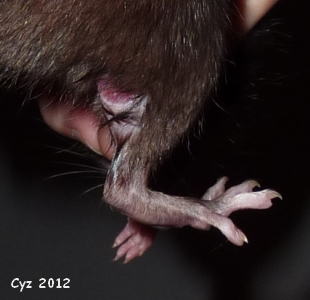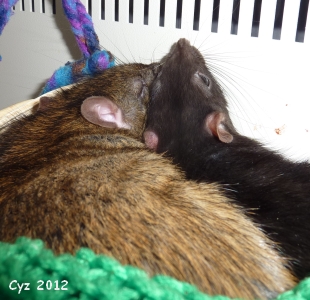Figure 1: Problematic introduction involving territorial aggression with resultant leg bite wound (Luna and Twix)
Case and photos
History
Luna (black self) and her sister are surrendered to a local rat rescue due to a decline of interest in them by their previous keeper (a young teenager). They are intact females of approximately 6 months old. They are very friendly and obviously used to handling, although especially Luna reacts skittishly to sudden sounds and movements.
Adoption
Luna and her sister are adopted from the rat rescue as company for Twix, a 1 year and 1 month old castrated semi-wild male rat, who has become single due to the passing away of his cage-mates (due to various causes). Note that, at 3 months old, Twix inflicted a bite wound during his (and his brother’s) introduction to three adult rats.
Introduction
During the initial introduction at the rat rescue, Luna is cautiously curious towards Twix and they sniff each other without fighting.
Three weeks later the girls are picked up. Once home, they are placed into a section of the large rat cage. Twix is housed in the adjacent section. He immediately displays piloerection (raised fur) and starts teeth-chattering and “foofing” (huffing and puffing) and pushing at the closed door between the sections. The fur on his flanks is wet (note that this is the location of scent glands). To decrease Twix’s stress level, and to avoid a potential accident should he be able to open the door, the girls are shifted within the cage so that there is an empty section between them and Twix. This maneuver has the desired effect.
The next day a section of the large rat cage is cleared out to serve as introduction area: floor surface = 90x56cm, height = 56cm. Note that the “small quarters” introduction method is quite common among local rat rescues and rat keepers; however, it is generally performed in a hospital or carrier tank, with a smaller surface area than what is used here. All introductions must (initially) be supervised very closely and constantly, and the supervisor must have something on hand that allows her to separate fighting rats quickly (for example, a magazine or thick gloves).
Twix, Luna and her sister are placed inside the cage section. The girls are curious but cautious. Twix immediately displays piloerection and sidling (crab-walking), promptly followed by an attack. While the girls are briefly removed from the cage for an inspection for possible injuries, Twix visibly relaxes: his fur returns to its normal state and he starts eating. This process repeats itself a few times. The girls’ nervousness increases to the point where Luna’s sister starts screaming at the slightest touch. When the girls attempt to jump out of the (open) cage section, the doors are closed.
A few moments later, during another attack by Twix, Luna’s right leg is injured: she sustains an approximately 1cm long horizontal clean-cut wound across the back of her right calf. There is minimal bleeding and she does not appear to be in any discomfort.
 Luna with leg injury |
Despite Luna’s injury, the introduction is continued the next day, with three adjustments:
- For the following days, the rats are switched into each others cage section every 12 hours, with only minor cleaning in between, to let them become accustomed to each others scent.
- The introduction location is moved to neutral territory (the walk-in shower), alternated with the free-range area (two large couches).
- During interactions Twix is closely guarded with gloved hands and blocked from becoming aggressive towards the girls: if he displays piloerection or sidling (which occurs less frequently in these locations), he is picked up and given a time-out until his fur returns to its normal position. Interestingly, Luna has not become fearful of Twix and she also displays some piloerection, “flank marking” (rubbing her body against objects), and tail wagging.
On average, two sessions are held each day, with increasing duration.
On day 3 the rats are free-ranging on separate couches, when Twix suddenly jumps to the girls’ couch. All goes well. When Twix becomes stressed/agitated, he returns to his couch, effectively creating his own time-out. During the next few days this process repeats itself several times.
From day 5 the introduction area is expanded with the cage, which is adjacent to the couches.
On day 8 the introduction is declared a success and the two newcomers are permanently housed with the resident rat.
Outcome
Twix appears quite fond of his new cagemates. No injuries have occurred since.
 Luna and Twix post completed introductions. |
Introduction description and photos courtesy of Cyzahhe


